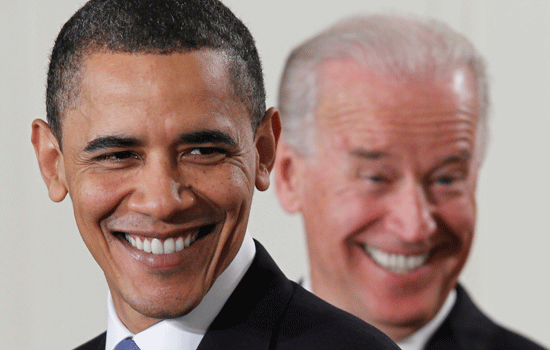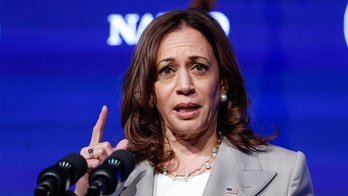
In this March 23, 2010 file photo, President Obama and Vice President Biden smile in the East Room of the White House, before the president signed the health care bill. (AP)
Despite intense Republican objections, President Obama on Saturday used recess appointments to fill 15 administration posts without Senate confirmation, including Craig Becker to the National Labor Relations Board.
By filling the jobs while Congress is in recess, Obama gets around Senate confirmation. Obama justified the move by charging Republicans with playing politics with his administration nominees.
"The United States Senate has the responsibility to approve or disapprove of my nominees. But if, in the interest of scoring political points, Republicans in the Senate refuse to exercise that responsibility, I must act in the interest of the American people and exercise my authority to fill these positions on an interim basis," he said in a written statement.
All 41 Senate Republicans wrote Obama this week urging him not to use a recess appointment for Becker, a former top lawyer with Service Employees International Union and the AFL-CIO, whose nomination was rejected by the Senate last month, 52-43.
The U.S. Chamber of Commerce also wrote Obama on behalf of 20 business groups that opposed Becker's nomination and decried the recess appointment.
"This recess appointment disregards the Senate's bipartisan rejection of Craig Becker's nomination to the NLRB," Chamber Vice President Randel Johnson said in a written statement.
"Overriding the will of the Senate and providing this special interest payback contradicts the president's claim to change the tone in Washington," he said. "The business community should be on red alert for radical changes that could significantly impair the ability of America's job creators to compete."
But White House spokeswoman Jen Psaki cast the opposition of Becker's nomination as part of an "unprecedented level of obstruction in the Senate" that had left "key economic positions unfilled, especially at time when our country is recovering from the worst economic crisis since the Great Depression."
Psaki said the five-member labor board had been trying to operate with only two members.
"The roadblocks we've seen in the Senate have left some government agencies like the National Labor Relations Board and the Equal Employment Opportunity Commission impaired in fulfilling their mission," she said in a statement. "These agencies can now get back to working for the American people."
The Senate's top Democrat, Harry Reid, welcomed Obama's move. "Regrettably, Senate Republicans have dedicated themselves to a failed strategy to cripple President Obama's economic initiatives by stalling key administration nominees at every turn," said Reid, the majority leader from Nevada.
But Republicans say Becker isn't working for all Americans.
"Craig Becker stands far outside the mainstream of NLRB nominees," Sen. Orrin Hatch, R-Utah, said in a written statement Thursday. "Given the bipartisan opposition to his nomination, the administration would be wise to not circumvent the will of the Senate by recess appointing him to the NLRB.
"There is no place on this powerful board for someone who believes that card check legislation -- getting rid of the secret union ballot -- can be enacted surreptitiously through regulation."
Sen. John McCain said the Senate has already delivered its verdict on Becker's ability to serve impartially on the labor board.
"If this administration chooses to recess appoint Mr. Becker, it would be just another example of putting the will of one special interest group over the will of the American people," he said.
Republicans wanted Obama to scrap Becker's nomination and appoint one Democrat, Mark Pearce, and one Republican, Brian Lewis, to the other vacant seats. Pearce was one of the 15 nominees appointed Saturday.
Democratic groups, such as the AFL-CIO, have said Becker's an experienced advocate for worker rights and have decried GOP "obstructionism."
But Obama didn't specifically address the controversy over Becker in his statement Saturday. Instead, he focused on the nominees still awaiting a vote in the Senate.
"At a time of economic emergency, two top appointees to the Department of Treasury have been held up for nearly six months," he said. "I simply cannot allow partisan politics to stand in the way of the basic functioning of government."
Obama noted that former President George W. Bush made 15 recess appointments by this point in his presidency, "but he was not facing the same level of obstruction."
According to the White House, Bush had five nominees pending on the Senate floor by the same point in his first term compared with Obama's 77 nominees.
Fox News' Major Garrett and the Associated Press contributed to this report.




